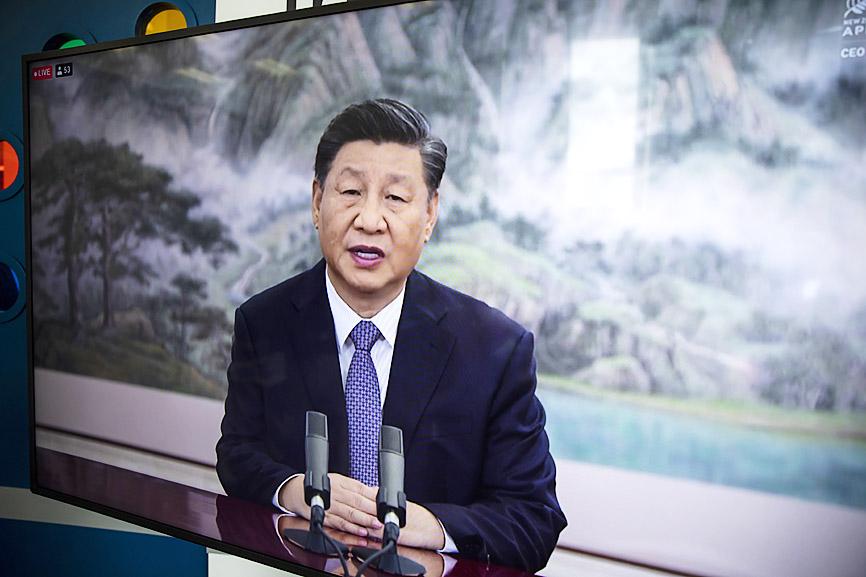Chinese President Xi Jinping (習近平) yesterday warned against letting tensions in the Asia-Pacific region cause a relapse into a “cold war” mentality.
His remarks on the sidelines of the annual summit of the APEC forum came weeks after Australia, the UK and the US announced a new security alliance in the region that would see Australia build nuclear submarines. China has harshly criticized the deal.
In a separate illustration of strains within APEC, one Southeast Asian delegate said that the group had so far failed to reach agreement on a US bid to host the 2023 summit due to unmet demands from Russia.

Photo: EPA-EFE
Xi spoke in a pre-recorded video to a CEO Summit at APEC, which is being hosted by New Zealand in a virtual format. Xi is scheduled to participate in an online meeting with other Pacific Rim leaders, including US President Joe Biden, tomorrow.
In his speech, Xi said attempts to draw boundaries in the region along ideological or geopolitical lines would fail. His reference to the Cold War echoes Beijing’s oft-stated position that the US should abandon that way of thinking in dealing with China.
“The Asia-Pacific region cannot and should not relapse into the confrontation and division of the Cold War era,” Xi said.
Xi also said the region should make sure to keep supply lines functioning and to continue liberalizing trade and investment.
“China will remain firm in advancing reform and opening up so as to add impetus to economic development,” he said.
Later in the day, top Chinese Communist Party leaders passed a resolution on the party’s past, which is expected to cement Xi’s legacy in Chinese history books.
About 400 members of the powerful Central Committee passed China’s resolution on “Major Achievements and Historical Experience of the Party’s Centennial Struggle,” the third ever such resolution in its 100-year history.
The lengthy report, which came on the final day of a plenary that started on Monday, called for upholding “the correct view of party history,” official news agency Xinhua said, adding that the party has “written the most magnificent epic in the history of the Chinese nation for thousands of years.”
“The Party Central Committee called on the entire party, the entire army and people of all ethnic groups to unite more closely around the Party Central Committee with Comrade Xi Jinping as the core, to fully implement Xi Jinping’s new era of socialism with Chinese characteristics,” the document read.
This year’s plenum paves the way for the 20th National Party Congress next year, at which Xi is widely expected to be handed a third term in office, securing his position as China’s most powerful leader since Mao Zedong (毛澤東).
Additional reporting by AFP

MAKING WAVES: China’s maritime militia could become a nontraditional threat in war, clogging up shipping lanes to prevent US or Japanese intervention, a report said About 1,900 Chinese ships flying flags of convenience and fishing vessels that participated in China’s military exercises around Taiwan last month and in January have been listed for monitoring, Coast Guard Administration (CGA) Deputy Director-General Hsieh Ching-chin (謝慶欽) said yesterday. Following amendments to the Commercial Port Act (商港法) and the Law of Ships (船舶法) last month, the CGA can designate possible berthing areas or deny ports of call for vessels suspected of loitering around areas where undersea cables can be accessed, Oceans Affairs Council Minister Kuan Bi-ling (管碧玲) said. The list of suspected ships, originally 300, had risen to about 1,900 as

Japan’s strategic alliance with the US would collapse if Tokyo were to turn away from a conflict in Taiwan, Japanese Prime Minister Sanae Takaichi said yesterday, but distanced herself from previous comments that suggested a possible military response in such an event. Takaichi expressed her latest views on a nationally broadcast TV program late on Monday, where an opposition party leader criticized her for igniting tensions with China with the earlier remarks. Ties between Japan and China have sunk to the worst level in years after Takaichi said in November that a hypothetical Chinese attack on Taiwan could bring about a Japanese

Right-wing political scientist Laura Fernandez on Sunday won Costa Rica’s presidential election by a landslide, after promising to crack down on rising violence linked to the cocaine trade. Fernandez’s nearest rival, economist Alvaro Ramos, conceded defeat as results showed the ruling party far exceeding the threshold of 40 percent needed to avoid a runoff. With 94 percent of polling stations counted, the political heir of outgoing Costa Rican President Rodrigo Chaves had captured 48.3 percent of the vote compared with Ramos’ 33.4 percent, the Supreme Electoral Tribunal said. As soon as the first results were announced, members of Fernandez’s Sovereign People’s Party

MORE RESPONSIBILITY: Draftees would be expected to fight alongside professional soldiers, likely requiring the transformation of some training brigades into combat units The armed forces are to start incorporating new conscripts into combined arms brigades this year to enhance combat readiness, the Executive Yuan’s latest policy report said. The new policy would affect Taiwanese men entering the military for their compulsory service, which was extended to one year under reforms by then-president Tsai Ing-wen (蔡英文) in 2022. The conscripts would be trained to operate machine guns, uncrewed aerial vehicles, anti-tank guided missile launchers and Stinger air defense systems, the report said, adding that the basic training would be lengthened to eight weeks. After basic training, conscripts would be sorted into infantry battalions that would take